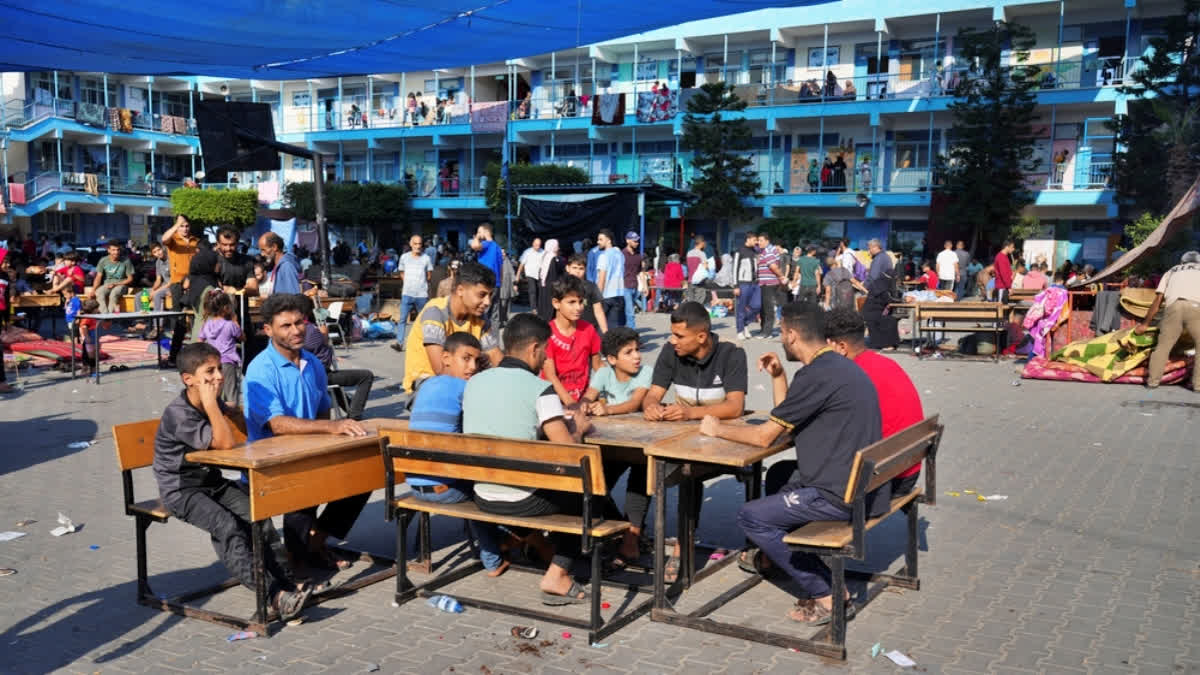Deir Al-Balah (Gaza Strip): Palestinians struggled Saturday to flee from areas of Gaza targeted by the Israeli military while grappling with a growing water and medical supply shortage ahead of an expected land offensive a week after Hamas’ bloody, wide-ranging attack into Israel.
Israel renewed calls on social media and in leaflets dropped from the air for Gaza residents to move south, while Hamas urged people to stay in their homes. The U.N. and aid groups have said such a rapid exodus would cause untold human suffering, especially for hospitalized patients, older adults and others unable to relocate.
The evacuation directive covers an area of 1.1 million residents or about half the territory’s population. The Israeli military said “hundreds of thousands” of Palestinians had already heeded the warning and headed south. It said Palestinians could travel within Gaza without being harmed along two main routes from 10 a.m. to 4 p.m. local time.
A week after Hamas' attack, Israel was still working to assess the casualties. With special rabbinic approval, workers at a military base in central Israel continued the gruelling task of identifying the bodies of the Israelis and foreign nationals who were killed, most of them civilians. Work is normally halted on Saturday, the Jewish Sabbath.
It was not clear how many Palestinians remained in north Gaza by Saturday afternoon, said Juliette Touma, a spokesperson for the U.N. agency for Palestinian refugees. “What we know is that hundreds of thousands of people have fled. And that 1 million people have been displaced in total in one week,” she said.
Families in cars, trucks and donkey carts packed with possessions crowded a main road heading away from Gaza City as Israeli airstrikes continued to hammer the 40-kilometer (25-mile) long territory, where basic necessities like food, fuel and drinking water were running low because of a complete Israeli siege.
Water has stopped coming out of taps across the territory. Amal Abu Yahia, a 25-year-old pregnant mother in the Jabaliya refugee camp, said she waits anxiously for a few minutes each day or every other day when contaminated water trickles from the pipes in her basement. She then rations it, prioritizing her 5-year-old son and 3-year-old daughter. She said she is drinking so little herself, she only urinates every other day.
Near the coast, the only tap water is contaminated with Mediterranean Sea water because of the lack of sanitation facilities. Mohammed Ibrahim, 28, said his neighbours in Gaza City have taken to drinking the salt water.
The Israeli military’s evacuation would force the territory’s entire population to cram into the southern half of the Gaza Strip as Israel continues strikes across the territory, including in the south.
Rami Swailem said he and at least five families in his building decided to stay put in his apartment near Gaza City. “We are rooted in our lands,” he said. “We prefer to die in dignity and face our destiny.”
Others were looking desperately for ways to evacuate. “We need a number for drivers from Gaza to the south, it is necessary #help,” read a post on social media. Another person wrote: “We need a bus number, office, or any means of transport,” posted another.
The U.N. refugee agency for Palestinians expressed concern for those who could not leave their current locations, “particularly pregnant women, children, older persons and persons with disabilities,” saying they must be protected. The agency also called for Israel to not target civilians, hospitals, schools, clinics and U.N. locations.
Officials at Gaza City’s largest hospital said evacuation was impossible. Al-Shifa was receiving hundreds of wounded every hour and had used up 95% of its medical supplies, hospital director Mohammed Abu Selmia said. Water is scarce and the fuel powering its generators is dwindling.
“The situation inside the hospital is miserable in every sense of the word,” he said. “The operating rooms don’t stop.”
Selmia estimated that 40,000 displaced civilians were sitting under the trees in the empty grounds surrounding the hospital, as well as inside the building’s lobby and corridors, hoping they would be protected there from the fighting.
Patients and personnel from the Al Awda Hospital in Gaza’s far north spent part of their night in the street “with bombs landing in close proximity,” the medical aid group Doctors Without Borders said.
An Israeli military spokesperson, Jonathan Conricus, said the evacuation was aimed at keeping civilians safe and preventing Hamas from using them as human shields. He urged people in the targeted areas to leave immediately and to return “only when we tell them that it is safe to do so.”
“The Palestinian civilians in Gaza are not our enemies. We don’t assess them as such, and we don’t target them as such,” Conricus said. “We are trying to do the right thing.”
Thousands of people crammed into a U.N.-run school-turned-shelter in Deir al-Balah, a farming town south of the evacuation zone. Many slept outside on the ground without mattresses, or in chairs pulled from classrooms.
“I came here with my children. We slept on the ground. We don’t have a mattress, or clothes,” Howeida al-Zaaneen, 63, who is from the northern town of Beit Hanoun, said. “I want to go back to my home, even if it is destroyed.”
The Israeli military said its troops conducted temporary raids into Gaza on Friday to battle militants and hunted for traces of some 150 people — including men, women and children — who were abducted during Hamas’ shocking Oct. 7 assault on southern Israel.
The Gaza Health Ministry said Saturday that over 2,200 people have been killed in the territory, including 724 children and 458 women. The Hamas communications office said that Israel has “completely demolished” over 7,000 housing units so far.
Hamas' surprise attack killed more than 1,300 people on the Israeli side, most of them civilians, and roughly 1,500 Hamas militants died during the fighting, the Israeli government said.
Egyptian officials said the country's Rafah border crossing with Gaza would open Saturday for the first time in days to allow foreigners out. One official said both Israel and Palestinian militant groups had agreed to facilitate the departures, but by Saturday evening there had been no movement.
There were believed to be some 1,500 people in Gaza holding Western passports and additional people with passports from other parts of the world.
Fearing a mass exodus of Palestinians, Egyptian authorities erected “temporary” blast walls on Egypt’s side of the crossing, which has been closed for days because of Israeli airstrikes, two Egyptian officials said on condition of anonymity because they were not authorized to brief the media.
Israel's raids into Gaza on Friday were the first acknowledgment that Israeli troops had entered the territory since the military began its round-the-clock bombardment in retaliation for the Hamas massacre. Palestinian militants have fired more than 5,500 rockets into Israel since the fighting erupted, the Israeli military said.
Israel has called up some 360,000 military reserves and massed troops and tanks along the border with Gaza. A ground assault in densely populated Gaza would likely bring even higher casualties on both sides in brutal house-to-house fighting.
U.S. Secretary of State Antony Blinken met with Saudi Arabian Foreign Minister Faisal bin Farhan in Riyadh on Saturday, and both called for Israel to protect civilians in Gaza.
“As Israel pursues its legitimate right to defend its people and to trying to ensure that this never happens again, it is vitally important that all of us look out for for civilians, and we’re working together to do exactly that,” Blinken said.
Hamas said Israel’s airstrikes killed 22 hostages, including foreigners. It did not provide their nationalities. The Israeli military denied the claim. Hamas and other Palestinian militants hope to trade the hostages for thousands of Palestinians held in Israeli prisons.
In the occupied West Bank, the Palestinian Health Ministry says 53 Palestinians have been killed since the start of the war, including 16 on Friday. The U.N. says attacks by Israeli settlers have surged there since the Hamas assault.
The U.S. and Israel’s other allies have pledged ironclad support for the war on Hamas. The European Union’s foreign policy chief, however, said Saturday that the Israeli military needed to give people more time to leave northern Gaza.
Josep Borrell welcomed the evacuation order but said, “You cannot move such a volume of people in (a) short period of time,” noting a lack of shelters and transportation.
Hamas’ media office said airstrikes hit cars in three locations as they headed south from Gaza City, killing 70 people. There was no comment from the Israeli military.



